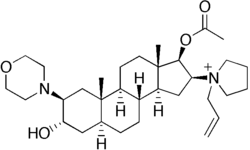Rocuronium bromide
 | |
| Clinical data | |
|---|---|
| AHFS/Drugs.com | Monograph |
| Routes of administration | Intravenous |
| ATC code | |
| Legal status | |
| Legal status | |
| Pharmacokinetic data | |
| Bioavailability | NA |
| Protein binding | ~30% |
| Metabolism | some de-acetylation |
| Biological half-life | 66–80 minutes |
| Excretion | Unchanged, in bile and urine |
| Identifiers | |
| |
| Synonyms | [3-hydroxy-10,13-dimethyl-2-morpholin-4-yl-16-(1-prop-2-enyl-2,3,4,5-tetrahydropyrrol-1-yl)-2,3,4,5,6,7,8,9,11,12,14,15,16,17-tetradecahydro-1H-cyclopenta[a]phenanthren-17-yl] acetate |
| CAS Number | |
| PubChem CID | |
| IUPHAR/BPS | |
| DrugBank | |
| ChemSpider | |
| UNII | |
| ChEMBL | |
| Chemical and physical data | |
| Formula | C32H53BrN2O4 |
| Molar mass | 609.678 g/mol |
| 3D model (JSmol) | |
| |
| |
| | |
Rocuronium bromide (brand names Zemuron, Esmeron) is an aminosteroid non-depolarizing neuromuscular blocker or muscle relaxant used in modern anaesthesia to facilitate endotracheal intubation by providing skeletal muscle relaxation, most commonly required for surgery or mechanical ventilation. It is used for both standard endotracheal intubation and rapid sequence induction (RSI), although Suxamethonium chloride is usually selected for RSI given its fast onset of action compared with rocuronium.[1]
Pharmacology
Mechanism of action
It was designed to be a weaker antagonist at the neuromuscular junction than pancuronium; hence its monoquaternary structure and its having an allyl group and a pyrrolidine group attached to the D ring quaternary nitrogen atom. Rocuronium has a rapid onset and intermediate duration of action.[2]
There is considered to be a risk of allergic reaction to the drug in some patients (particularly those with asthma), but a similar incidence of allergic reactions has been observed by using other members of the same drug class (non-depolarizing neuromuscular blocking drugs).[3]
The γ-cyclodextrin derivative sugammadex (trade name Bridion) has been recently introduced as a novel agent to reverse the action of rocuronium.[4] Sugammadex has been in use since 2009 in many European countries; however, it was turned down for approval twice by the US FDA due to concerns over allergic reactions and bleeding,[5] but finally approved the medication for use during surgical procedures in the United States on December 15, 2015.[6] Neostigmine can also be used as a reversal agent of rocuronium but is not as effective as sugammadex. Neostigmine is often still used due to its low cost compared with sugammadex.[7]
History
It was introduced in 1994, and is marketed under the trade name of Zemuron in the United States and Esmeron in most other countries.
Society and Culture
On July 27, 2012, the U.S. state of Virginia replaced pancuronium bromide, one of the three drugs used in execution by lethal injection, with rocuronium.
On 3 October 2016, the U.S. state of Ohio announced that it would resume executions on January 12, 2017, using a combination of midazolam, rocuronium bromide, and potassium chloride. Prior to this, the last execution in Ohio was in January 2014.[8]
References
- ↑ Tran, DT; Newton, EK; Mount, VA; Lee, JS; Wells, GA; Perry, JJ (29 October 2015). "Rocuronium versus succinylcholine for rapid sequence induction intubation.". The Cochrane database of systematic reviews. 10: CD002788. PMID 26512948. doi:10.1002/14651858.CD002788.pub3.
- ↑ Hunter JM (April 1996). "Rocuronium: the newest aminosteroid neuromuscular blocking drug". British Journal of Anaesthesia. 76 (4): 481–3. PMID 8652315. doi:10.1093/bja/76.4.481.
- ↑ Burburan SM, Xisto DG, Rocco PR (June 2007). "Anaesthetic management in asthma". Minerva Anestesiologica. 73 (6): 357–65. PMID 17115010.
- ↑ Naguib M (March 2007). "Sugammadex: another milestone in clinical neuromuscular pharmacology". Anesthesia and Analgesia. 104 (3): 575–81. PMID 17312211. doi:10.1213/01.ane.0000244594.63318.fc.
- ↑ McKee, Selina (September 24, 2013). "FDA turns down Merck & Co's sugammadex again". PharmaTimes.
- ↑ "Press Announcements - FDA approves Bridion to reverse effects of neuromuscular blocking drugs used during surgery". www.fda.gov. Retrieved 2017-01-07.
- ↑ Carron, Michele; Zarantonello, Francesco; Tellaroli, Paola; Ori, Carlo. "Efficacy and safety of sugammadex compared to neostigmine for reversal of neuromuscular blockade: a meta-analysis of randomized controlled trials". Journal of Clinical Anesthesia. 35: 1–12. doi:10.1016/j.jclinane.2016.06.018.
- ↑ "Ohio to resume executions using a three-drug combination in January". BBC News. 2016-10-03. Retrieved 2017-01-07.